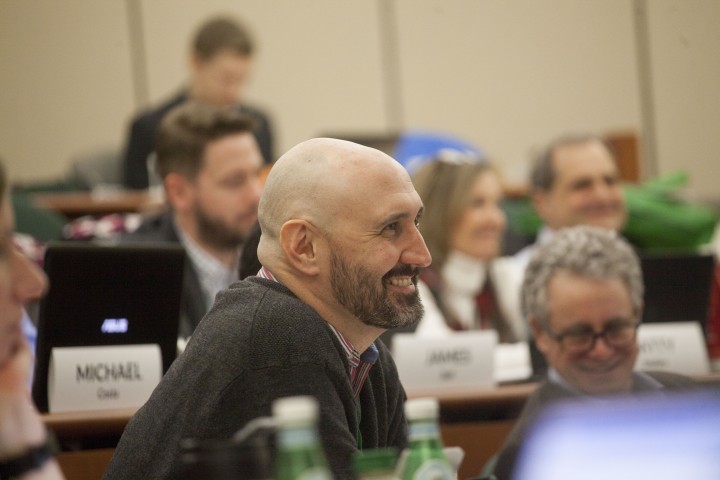The Online Hybrid MHCDS Learning Model
Dartmouth’s Master of Health Care Delivery Science is a hybrid degree program that combines best-in-class online learning with residential experiences to shape a cohort of health care professionals into transformative leaders. However, our approach goes much deeper than the hybrid-online label reveals.
In order to lead change in health care delivery, students must acquire specialized knowledge, be skilled at collaborative decision-making, and be able to draw on multiple perspectives. In that regard, the MHCDS Learning Model is used as a pathway for enabling students to meet these goals. Here's how this approach is reflected in the curriculum:
Facilitated by Faculty

Context for Learning: Problems are framed by actual events or are “based on true events,” thus keeping the content immediately applicable, student-focused, and current.
Facilitated Learning: Faculty ask students to participate in collaborative decision-making, a method requiring students to consider health care dilemmas via multiple perspectives, including the specialized knowledge or skills within the cohort, in order to identify potential solutions.
Learner-Centered

Curriculum continuously evolves in order to address real-world challenges. Students influence what their peers learn, as well as what future cohorts learn, by bringing real-world examples, experiences, and reflections.
Courses have a standard design and fixed weekly schedule (we call it the rhythm of the week), so students can focus on learning and less on navigating.
Materials are aligned with the objectives of the assignments, the week, the course, and the curriculum and also support a collaborative learning environment that draws upon the deep expertise of the students themselves.
Influenced by Feedback

Rhythm of the Week
Preparation for first (1st) residential consists primarily of readings and videos that are completed independently in order to front-load the onsite classroom experiences. However, typical online courses seek to create a student experience characterized by a co-learning environment and have a standard design as well as a fixed weekly schedule ( "rhythm of the week"), so students can focus on learning and less on navigating. The rhythm of the week is outlined below:
- Materials (e.g., readings and videos) are always found on the online Materials page for each week of every course. They're aligned with the objectives of the assignments, the week, the course, and the curriculum, and they support a co-learning environment.
- Tuesday Live Meetings: Students are required to attend and actively participate in live, synchronous online meetings every Tuesday for one hour when courses are in session. Live meetings are offered at two different times (12 p.m. ET or 7 p.m. ET), and students can choose which time slot works best for them. The purpose of these meetings is to gain multiple points of view and to take advantage of specialized knowledge or skills within the class. Unlike in traditional classrooms where faculty predominantly lecture, MHCDS students are expected to review new content (often a case study or “based on true events” articles) prior to the live meetings. During the meeting, faculty ask students to take on the role of manager and decision-maker and to discuss the content as a group, drawing on relevant course materials and personal experiences.
I’ve been surprised how important my classmates are to my learning and growth. Their input and perspective is so critical to my understanding of the material, and I’ve been impressed about how my own growth has been so closely tied to theirs as well."
- Thursday Individual Assignments: Each Thursday at midnight (Eastern time), you can expect an individual assignment to be due. These are generally small assignments meant to help you link the week's material to your individual work experience. A typical Thursday assignment would be to answer a faculty question by posting a thoughtful response to the class discussion board or, in a quantitative course such as finance, to complete a small problem set.
- Sunday Group Assignments: Each Sunday at midnight (Eastern time), you can expect a study group assignment to be due. These are the most substantive assignments for the week, and because of their complexity, they require input from the entire study group. While most study groups assign one individual to coordinate the response, it is essential that every member of the group contribute to the assignment to ensure individual learning, sustainable teamwork, and the best possible deliverable.
The faculty are world class leaders in their respective domains. My classmates are incredibly accomplished, incredibly diverse, and great teachers. Together they create a rich learning environment and educational product who’s sum total is far in excess of its individual parts."
Study Groups

Online Technology Integration
The technology we ask students to use is purposefully selected to support the MHCDS online Learning Model. For example, to facilitate the co-learning and collaborative decision-making aspects of the program, MHCDS uses Zoom video-conferencing technology. Zoom is highly intuitive and allows you to easily see and share a live video stream of all your classmates and faculty, share slide presentations, and hear discussions via computer or phone.